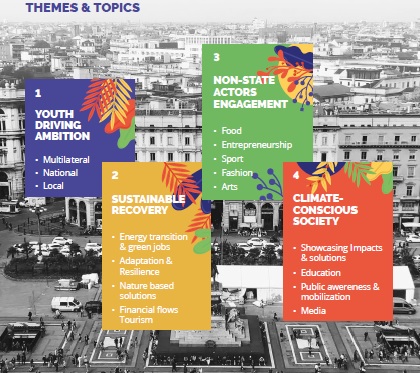COP26 and climate change education
03 November 2021
 Shelley Monk - Geography Subject Advisor
Shelley Monk - Geography Subject Advisor
We know many young people are interested in climate change, and they want to know what contribution they can make. In this blog I explain the aims of COP and present some ideas and resources you might like to use and share with your students.
What is COP26?
The United Nations climate change Conference of the Parties (COP) started in Glasgow on 31 October 2021 and will run until 12 Nov 2021. The aim of the conference is to bring people together to ‘accelerate action’ towards goals identified in the Paris Agreement and UN Framework Convention on Climate Change. There’s more information in this COP overview.
What does COP want to achieve?
- Secure global net zero by mid-century and keep 1.5 degrees within reach. (Emission reduction targets, reaching net zero, phasing out coal and renewable energy investment.)
- Adapt to protect communities and natural habitats. (Protect and restore ecosystems, build defences and warning systems, more resilient infrastructure and agriculture.)
- Mobilise finance. (Developed countries to raise $100bn climate finance per year and international finance institutions to drive goals and secure global net zero.)
- Work together to deliver. (Finalise the Paris Rulebook, accelerate collaboration around the world to deliver climate goals faster.)
How young people can get involved
There have been many climate events preceding COP26. In late September 2021, 400 young climate leaders (aged 15 to 29) from 186 countries met in Milan for the ‘Youth4Climate: Driving Ambition’. Find out more about the themes and topics discussed and read their manifesto.

Here are some ideas and resources you might like to use and share with your students:
- Calculate their carbon footprint with the International Student Carbon Footprint Challenge
- Find out their environmental footprint with the World Wildlife Fund.
- Discover the environmental impact of their schools with Carbon Partners UK.
- Learn more about the eco-environmental issues through the Young People’s Trust for the Environment.
- Find out more about climate change with Climate Kids from NASA.
- Get involved in COP26 with the Youth Hub.
- Look at the science behind climate change in more detail with resources from the Royal Society.
There are also plenty of ways students can embrace sustainability in day-to-day life:
- Journey to school: Can students walk, cycle or travel in an electric vehicle?
- Households: Do students and their families recycle? Dispose of their food waste in a green bin/compost? Think about their energy use? How can they reduce their plastic waste?
- Gardens/balconies: Do families grow fruit/vegetables? Can they provide habitats, feed birds, build a bug hotel, hedgehog homes, plant bee and insect loving plants?
Find out from UNICEF’s young environment and climate activists what students are doing around the world.
Educational resources
The UN suggests that there are nine things young people can do ‘right now’, one of which is to educate themselves about the impacts of climate change. As educators we all play a role in that, most obviously through the curriculum.
Our Geography A and Geography B GCSE qualifications cover the causes and impacts of climate change, as well as sustainability. We have an optional topic for our A Level qualification called ‘Climate Change’ as we knew this was of interest to students and teachers. The students can explore national and global perspectives on this issue, what the challenges are and understand the range of responses to climate change.
Our students have a chance to build their understanding, so they can become the informed decision-makers and change-makers of the future.
Resources which you may find useful when teaching about COP26 and climate change include:
- UN climate change conference UK 2021
- Schools Pack: Resources – Together For Our Planet (ukcop26.org)
- Schools Pack: Get Inspired – Together For Our Planet (ukcop26.org)
- UN climate change conference UK 2021 - BBC teaching resources.
- Geographical Association, COP26 pledges for action and meaningful impact. COP26 Pledges – Save our Planet.
- InterClimate network: Bring a COP style climate conference into school.
- ESRI and the Met Office have produced a resource called Climate Change in the UK.
- Education hub blog: How education plays a key role at COP26 and in the fight against climate change (#onestepgreener campaign).
Are there opportunities beyond the curriculum which could engage young people with the environment? These could include outdoor learning, conservation projects, school gardens, eco-schools and planet pledges.
Stay connected
We would love to hear more about what you are doing with your students in school. Please share ideas below, send them to geography@ocr.org.uk or tweet @OCR_Geography. You can also sign up for email updates for information about resources and support.
About the author
Shelley joined OCR after teaching geography for 16 years. She has considerable experience in delivering GCSE, IGCSE, A Level and the International Baccalaureate qualifications, as well as leading departments in secondary schools in the UK and internationally. She has eight years’ experience as Head of Year 12 and 13, supporting students both pastorally and academically. Shelley worked with the geography team to reform the GCSE, AS and A Level qualifications and she currently supports teachers through the development of a variety of resources, the CPD programme and subject communications. She loves walking her dog, exploring distant places and finding new recipes to trial on family and friends.